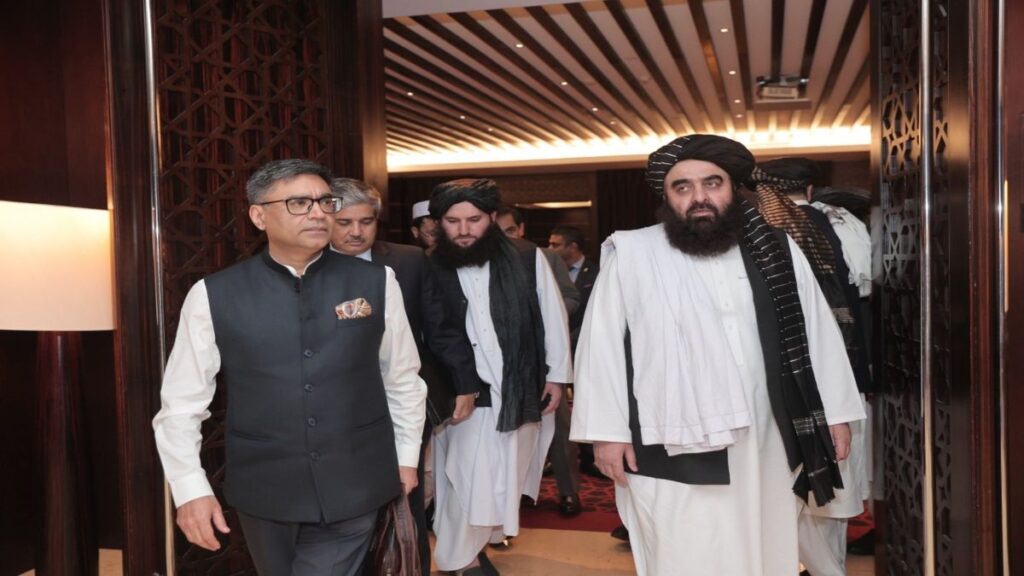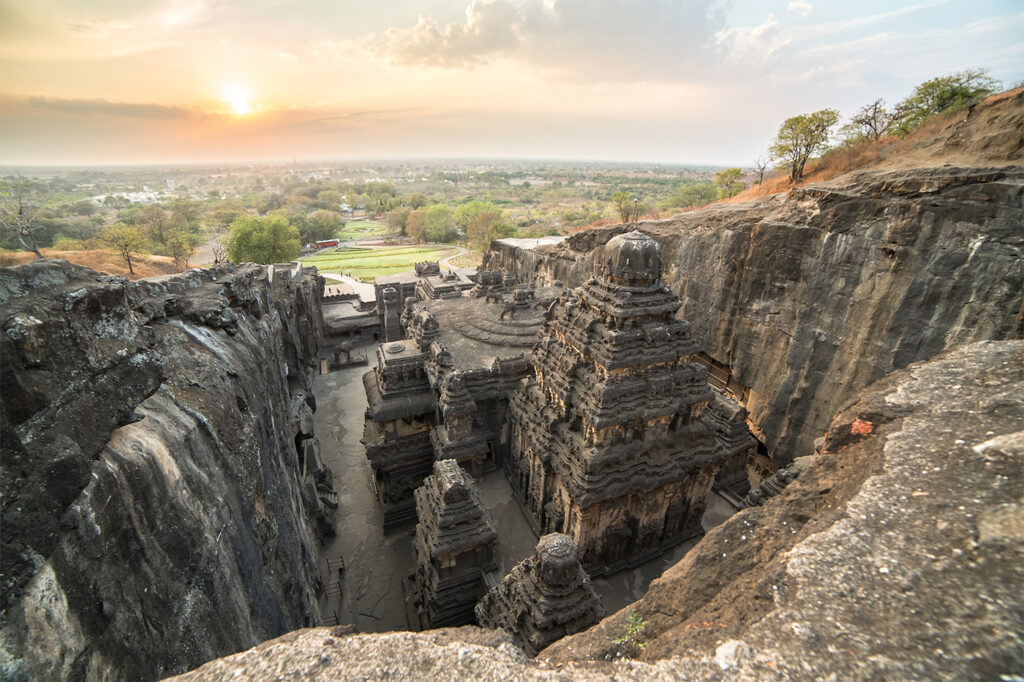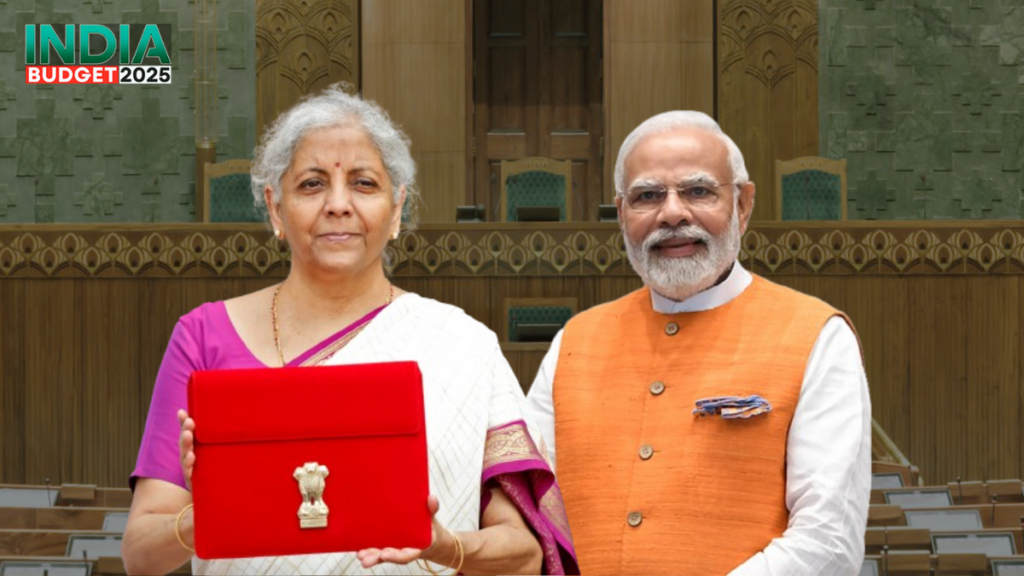
India & the Taliban, a brief history from 1996 to 2025
The year 2025 began with an unprecedented development in India-Afghanistan ties, something that was unthinkable at one time happened. A top Indian government official, foreign secretary Vikram Misri meeting Afghanistan’s acting foreign minister, or top Taliban official, Mawlawi Amir Khan Muttaqi. On the table were several issues, but a message that the Delhi and Taliban are going to increase engagement. The engagement continues despite Taliban being on the UN sanctions list and not recognised by India. Explaining the history of ties:
Taliban in Kabul: 1996-2001
Taliban first came as a major political force in 1996, till it was overthrown by US invasion in 2001 post the 9/11 terror attacks planned by Osama Bin Laden. Laden planned the terror attacks from Afghanistan but he was killed by American forces in 2011 in Pakistan’s Abbottabad. The Taliban regime of 1996 was known for its strict religious regulation, and was opposed by the Northern Alliance led by Ahmad Shah Massoud. While the Taliban back then was supported by Pakistan, the northern alliance was supported by Massoud. Infact, a road in Delhi’s diplomatic enclave is named after Massoud to honour him. Northern Alliance not only had India’s support but also Iran, Russia, Tajikistan, Turkmenistan, US, Uzbekistan. India back then recognised Burhanuddin Rabbani as Afghan President and not Taliban regime MEA’s annual report of 1999 sums up the situation. “The continuation of the civil war principally on account of the intransigence of the Taliban and its foreign mentor, Pakistan, continued to bring great suffering for a people with whom we have historical ties of friendship and cooperation”, the report says.
IC814 Hijacking
But 1999 was the year when India established direct contact with Taliban but that was due to an unfortunate incident. The hijacking of Indian Airlines Flight IC 814 by Pakistani terrorists who took the plane from Kathmandu to Kandahar via Amritsar, Lahore, Dubai. The MEA report of 1999 details, “The role played by the Taliban during this crisis was noted but we made it clear that the fundamentals of our Afghan policy would not change.” The Taliban essentially played a key interlocutor between the Indian govt and the hijackers. The hijackers initially demanded the release of many terrorists, $200 million, and the coffin of a deceased terrorist but that is believed to have been dropped at the instance of the Taliban. India had eventually released 3 terrorists, and they were allowed to travel to Pakistan, and were not arrested by Taliban as Delhi had hoped for. But the images of Taliban fighters around the hijacked plane still remain fresh in the minds of Indians.
UN Sanctions, 1999
1999 was an important year since that year a key resolution was passed, the UNSC resolution 1267 that imposed sanctions on Taliban. The sanction regime imposed air embargoes, financial sanctions against Taliban in response to threats posed by Osama Bin Laden, Al Qaida etc. MEA’s 1999 Annual report says, “India played an active role in the formulation of the resolution.” What is interesting to note is that this sanction regime directed at Taliban later became the 1267 sanctions committee that not only oversees the implementation of the sanctions but also later on broadened its scope to include Pakistani terrorists. Currently the 1267 sanctions regime lists many Pakistan-based terror groups like Lashkar-e-Taiba (LeT) and Jaish-e-Mohammed (JeM) involved in terror attacks in India including the 2019 Pulwama terror attack. All UNSC members are members of the 1267 committee.
UNGA, 1999
That year in August, UNGA also held an open debate on Afghanistan. The debate generally saw countries taking tough positions against the Taliban. MEA annual statement of the year says, India statement during the debate “noted that the criminal conduct of Taliban had negative implications for peace and security in Afghanistan and the region”. India also “drew attention to international terrorist groups who find a safe haven in Afghanistan and the dangerous nexus between the Taliban, terrorism and the drug mafias operating in the region.” All in all, Delhi, “called upon the Security Council and the international community to take meaningful and effective measures in this regard.”
Taliban out of Kabul: 2001-2021
With US invasion of Afghanistan post 9/11 terror attacks, the Taliban was out and the Afghan republic was established. India increased its engagement, humanitarian support and infrastructure projects in the country. From dams (Salma Dam/ India Afghanistan friendship dam 2016) to Parliament (2015), from education to community projects, India was actively involved in rebuilding Afghanistan after decades of war and civil war. Both countries jointly launched the ‘New Development Partnership’ in September 2017 to further enhance India’s development assistance to Afghanistan. India had also agreed to undertake the Shahtoot Dam project which will provide drinking water to residents of Kabul besides rehabilitation of existing irrigation and drainage networks. But the Taliban, while on the sanctions list, was a major insurgent group and continued to commit a number of attacks against occupying American forces. The US after 2 decades of presence decided to leave the country. With direct talks in Doha starting 2018, it was a matter of time and the day came in August 2021. The Afghan republic fell like a pack of cards as the then Afghan President Ghani fled the capital as the Taliban came back with full force as the new rulers and the new reality of Afghanistan.
2018: Sharing the table
India first shared the table with Taliban in 2018, in Moscow at the Russia sponsored peace conference. India was represented at what was known as the “non official level”, with 2 former Indian ambassadors to Afghanistan and Pakistan, Amar Sinha and TCA Raghavan representing Delhi. India continued to support peace and reconciliation efforts with a policy that was “Afghan led, Afghan owned, Afghan controlled”. The Taliban was led by Sher Mohammad Abbas Stanakzai and the Afghan republic govt, though its high peace council was present at the table for what came to be known as intra Afghan talks. The Taliban and US soon started to have a conversation with Qatar playing a key role.
India had continued to engage on Afghanistan’s future via the Moscow talks. By 2019, it looks like the Taliban will be a potent force. In one of the first interviews to India based media, Taliban spokesman Zabihullah Mujahid while speaking to WION showed the group’s intent to protect the minorities and Chabahar port. On ties with India, he said, “Afghanistan wants good relations with all its neighbouring and regional countries.” That interview was one of the first public comments by the Taliban on India.
Doha peace process
The Doha Peace Process, a series of negotiations aimed at ending the conflict in Afghanistan, primarily involving the Taliban, the Afghan government, and international stakeholders, notably the United States. India was present in many of its meetings though not as a negotiating party. India was invited to be part of the US Taliban peace deal signing ceremony in Doha in 2020.
Taliban Back in Kabul: 15th August 2021
It is a day when India celebrates its independence day, but it was the day when Taliban re-entered Kabul after 2 decades. As an immediate reaction, India closed its embassy in the country, and launched operation “Devi Shakti” that saw evacuation of its citizens, embassy staff, Afghan nationals from minority communities like Sikhs & Hindus. India, which had a large diplomatic presence, overnight reduced its presence to zero.
August: First acknowledgement of talks
August 2021 were pivotal for Afghanistan, but India, and the wider region. On the last day of August 2021, that is on 31st August first known engagement happened between India and Taliban. These talks were publicly announced by India’s Ministry of external affairs, in what was first such confirmation. Head of Taliban’s Political Office in Doha Sher Mohammad Abbas Stanekzai met with the then Indian ambassador to Qatar, Deepak Mittal. The meeting happened at the Indian embassy, with the MEA statement saying, “discussions focused on safety, security and early return of Indian nationals stranded in Afghanistan. The travel of Afghan nationals, especially minorities, who wish to visit India also came up”. Ambassador Mittal raised India’s concern that “Afghanistan’s soil should not be used for anti-Indian activities and terrorism in any manner.”
August 2021: India at UNSC
Interestingly, that month, when Taliban re entered Kabul, India was the President of the United Nations Security Council. India, under its UNSC presidency, convened emergency meetings to address the rapidly deteriorating situation in Afghanistan. These meetings took place on August 6 and August 16, 2021, focusing on the Taliban’s offensive and the unfolding humanitarian crisis. India, through its UNSC statements, condemned the Taliban’s violence and emphasized the need for an immediate reduction of hostilities. On the 16th of August 2021 meet, India’s then ambassador to UN TS Tirumurti said, “There is widespread panic…security situation remains precarious” & as a “neighbour & friend of Afghanistan, the current situation is a great concern to us, in India”
India played a significant role in the adoption of UNSC Resolution 2593 on August 30, 2021, which demanded that Afghan territory not be used to threaten or attack any country or shelter terrorists. This resolution was crucial as it came right after the Taliban’s takeover and was adopted under India’s presidency, though with abstentions from Russia and China.
2022: First steps towards engagement
June 2022, was pivotal in many ways as India not only announced the opening up of its technical mission in the country, a de facto embassy to monitor and coordinate India’s humanitarian assistance in Afghanistan but also the visit of India’s points person on Afghanistan, MEA’s Joint Secretary & head of Pakistan Afghanistan Iran division JP Singh. Taliban welcome the engagement. Abdul Qahar Balkhi, spokesperson of the Taliban-run Afghan foreign ministry said, “the return of Indian diplomats to Afghanistan & reopening of embassy demonstrates that security is established in the country, & all political & diplomatic rights are respected.”
Visit of JP Singh was the first official visit by an Indian diplomat since the Taliban took control of Afghanistan in August 2021. He visited projects like the Chimtala Power Station and the Indira Gandhi Institute of Child Health.
Singh also met with Taliban’s Sher Mohammad Abbas Stanekzai as well. Important to point, Stanekzai was trained at the Indian Military Academy (IMA) in Dehradun, India, from 1979 to 1982 under an Indo-Afghan cooperation program. He completed his pre-commission training at IMA for a year and a half, where he was known by the nickname “Sheru” among his batchmates. This visit was focused on overseeing the delivery of humanitarian assistance from India. During the visit the Indian team visited Indian projects in the country as well.
For the Taliban, keen to get global recognition, it was a positive development. Balkhi , “The Islamic Emirate of Afghanistan welcomes India’s step to upgrade its diplomatic representation in Kabul. Besides ensuring security, we will pay close attention to the immunity of the diplomats and cooperate well in endeavors.”
Meanwhile, while the political regime changed, India’s outreach to Afghan people continued. That year, India supplied several shipments of humanitarian assistance consisting of 40,000 MT of wheat, 55 tons of medicines, 500,000 doses of Covid vaccines and winter clothing. In the wake of the tragic earthquake that struck Eastern Afghanistan on 22 June 2022, India dispatched 28 tons of emergency relief assistance in two flights for the people of Afghanistan.
2023: Cautious engagement
Focus remained on India’s humanitarian support, use of Chabahar port in Iran for connectivity, and overall expanding political and diplomatic ties. India continued to send Afghanistan wheat, medicines, medical and surgical items throughout 2023 despite the continuation of the Taliban regime. Delhi partnered with the United Nations Office on Drugs and Crime (UNODC) in Afghanistan, to provide assistance for the welfare of the Afghan drug-user population, especially women. Under this partnership, 11,000 units of female hygiene kits, baby food, general-use hygiene kits, blankets, clothing, footwear, medical aid and other miscellaneous items were supplied.
While issuance of visas to Afghans remains restricted post Taliban return, under the Indian Council for Cultural Relations (ICCR) scholarship scheme, fresh admissions were granted to more than 2000 Afghan students, including 301 girls. ICCR began providing online scholarships for 1000 Afghan students through e-VidyaBharti portal in the academic year 2023-24. The two countries continued to interact in the sporting domain with Afghan players visiting India to participate in various sporting events like the International Chess Olympiad, Cricket-IPL and ICC Cricket World Cup.
2024: visits from Delhi
The engagement continued as Indian Diplomat JP Singh visited the country in March and November. During the march, an Indian diplomat & his delegation met Afghanistan’s acting foreign minister Mawlawi Amir Khan Muttaqi. His delegation included a woman diplomat Deepti Jharwal, who was back then in the PAI division of the MEA. The presence of a women diplomat was seen as significant at a time when Taliban was being criticised globally over its rules on women’s role in the society.
Singh again visited Afghanistan in November of 2024 during which he not only met Afghanistan’s acting foreign minister Mawlawi Amir Khan Muttaqi but also defence minister Mohammad Yaqoob, former Afghan President Karzai. This was the first time a top Indian diplomat from Delhi was meeting Taliban’s Yaqoob who is the eldest son of Mullah Mohammad Omar, the founder of the Taliban.
In June, India attended the Doha UN meet on Afghanistan with Taliban’s Zabihulah saying that a bilateral meet happened with MEA’s JP Singh. Meanwhile lots of changes happened at the Afghan embassies in India as well as diplomats appointed by the Afghan republic left. In November 2024, Ikramuddin Kamil was appointed as the acting consul at the Afghan Consulate in Mumbai, marking the first such appointment by the Taliban in India. Kamil studied in India for seven years, completing his doctorate from South Asia University in New Delhi on a scholarship provided by the Indian Ministry of External Affairs (MEA). Indian sources have said as far as his affiliation is concerned “for us, he is an Afghan national working for Afghans in India”.
2025: India ups the engagement with Taliban
With work done in 2022, 2023, 2024, Kabul and Delhi looked fairly confident to firm up engagement. And that happened on 8th January 2025, with first ever talks between top Indian govt officials with Taliban leadership. Indian foreign secretary Vikram Misri met Acting Foreign Minister of Afghanistan, Mawlawi Amir Khan Muttaqi, in Dubai. During the talks both sides discussed Indian humanitarian assistance, Chabahar port project, support to Afghan refugees, India’s security concerns, and even cricketing ties.
A statement from the ministry of external affairs said, “The two sides evaluated the ongoing Indian humanitarian assistance programmes. The Afghan Minister appreciated and thanked the Indian leadership for continuing to engage and support the people of Afghanistan. In view of the current need for development activities, it was decided that India would consider engaging in development projects in the near future, in addition to the ongoing humanitarian assistance programme.” During the talks, the Afghan side hoped that Afghan students could get visas soon. The Indian visa issuance, an issue that comes under India’s home ministry, was stopped in 2021 with the fall of Kabul.
Clearly, from 1996 to 2025, India-Taliban ties have come a long way. India sees Afghanistan as an important neighbour, with historic connection and while the political color has changed in Kabul, Delhi’s humanitarian support to Afghan people continues. All in All, the engagement is expected to continue and grow as well.





Responses